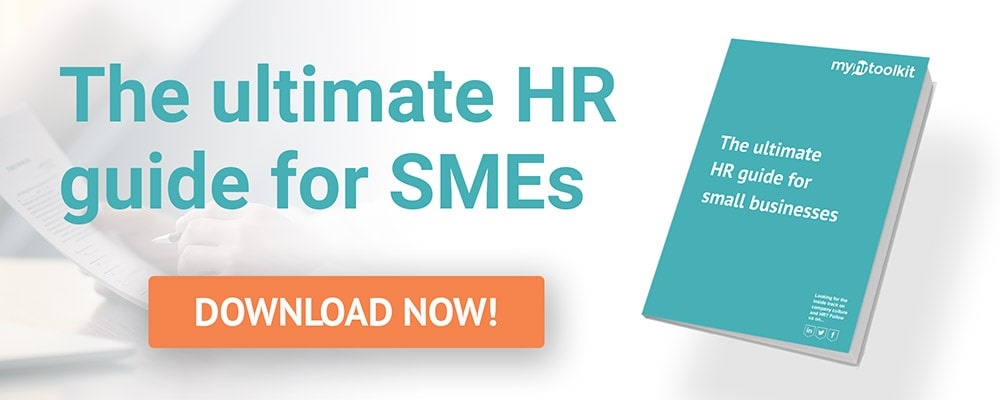Learn about the importance of employee feedback for business improvement and growth with this guide from HR consultant and author Gemma Dale.
There are two types of employee feedback; that which is provided on an individual basis to an employee (usually about their performance) and feedback from employees to the organisation itself. Many organisations are well versed in the former, often with detailed policies and structures around performance discussions and appraisal. However, not all of them are quite so organised when it comes to seeking feedback from their employees - and the importance of feedback can be overlooked.
Improve how you manage employee performance and the admin processes and reminders involved with myhrtoolkit's performance management module for SMEs.
All too often, employee feedback is an irregular event; in some organisations, feedback is only sought via an annual engagement survey. Whilst these can be a helpful tool, they are often limited in scope, offering only rating scales with perhaps one or two open ended text boxes for individual comment. This is a missed opportunity. Seeking regular employee feedback, and having a strategic approach to its collection and analysis, can bring real business benefits.
Employee voice
Employee voice is the formal term that is often used to describe the process through which employees contribute to and influence organisational decision making. Voice is also about the opportunity for employees to express their views and opinions and make suggestions. It is seen as a key enabler of employee engagement. It can provide insights into the organisation that may otherwise be invisible to leaders, generate new ideas and provide opportunities for learning and improvement. Finally, seeking feedback can allow problems and challenges to be identified.
How to ask for employee feedback

There are many ways though which employers can seek and encourage employee feedback. The first is the aforementioned regular employee engagement survey, which allow large amounts of data to be collected at once. These large surveys can be complimented by more targeted, shorter ‘pulse’ surveys.
Pulse surveys
Pulse surveys can be used to explore a particular topic or to target feedback from particular group of employees, such as new starters or people managers. Surveys often have the benefit of being anonymous, allowing employees to speak freely about their thoughts and feelings. They can provide easy to understand statistics and comparisons with previous survey responses.
Focus groups
For deeper exploration of topics or themes, focus groups can be another valuable tool for seeking employee feedback. They do require a greater time investment, both to run them and analyse their outputs, but they can be a source of rich data and insight.
Exit interviews
Other familiar tools for employee feedback are exit interviews and suggestions schemes. Exit interviews of course typically seek to investigate why people choose to leave an organisation. Suggestion schemes allow employees a mechanism through which they can put forward their own ideas. Whilst these may seem a little old-fashioned today, they can provide useful information and should not be overlooked when developing a strategic approach to feedback and listening.
Stay interviews
A perhaps less well known approach is the ‘stay interview’, designed to investigate why an employee chooses to stay with an organisation as well as what they enjoy about their role. These can help to surface both individual and more general concerns and issues that might be common to many employees – but they are only likely to generate useful insight in an organisational culture where it is psychologically safe to speak up openly.
There is no single best way to solicit employee feedback. A mix of different approaches will be needed to elicit the most benefits to the organisation, as well as the broadest possible insight. Above all, seeking employee feedback needs to be a continuous process. Listening should take place on an ongoing, planned, and regular basis.
Learn more: How to get employees to stay
How to respond to employee feedback

In some respects, seeking feedback is the easy part. Acting on its content can be more complex and time consuming, especially when you receive negative employee feedback. However, unless employees can see that their feedback is valued and acted upon, they may well be reluctant to provide feedback in the future.
When feedback has been sought, its outcomes should be shared with the employees who provided it. The organisation should also confirm to employees what they intend to do in response – and then tell people again when they have done it. ‘You said, we did’ is the simple description of this approach. Transparency is key.
Employee involvement
Wherever possible, organisations should involve employees in developing any plans and actions as a result of the feedback. This will help to foster a sense of ownership and engagement, and make the most out of any employee feedback received.
There are many reasons to take feedback from your employees. No leadership or management team has all the answers or ideas. Sometimes these lie elsewhere in the organisation - with the people that work for you. Seeking their regular feedback and suggestions is just one way to bring them to the forefront.
Read more from the myhrtoolkit blog
How to develop a performance management plan for your small business

Written by Gemma Dale
Gemma Dale is an experienced senior HR professional, CIPD Chartered Fellow, HEA Fellow, and a regular speaker and writer on a variety of HR topics. Gemma is the co-author of the book 'Flexible Working' published by Kogan Page in 2020. She is also a lecturer in the Business School at Liverpool John Moores University and runs her own business, The Work Consultancy.


 Holiday Planner
Holiday Planner Absence Management
Absence Management Performance Management
Performance Management Staff Management
Staff Management Document Management
Document Management Reporting
Reporting Health and Safety Management
Health and Safety Management Task Management
Task Management Security Centre
Security Centre Self Service
Self Service Mobile
Mobile




